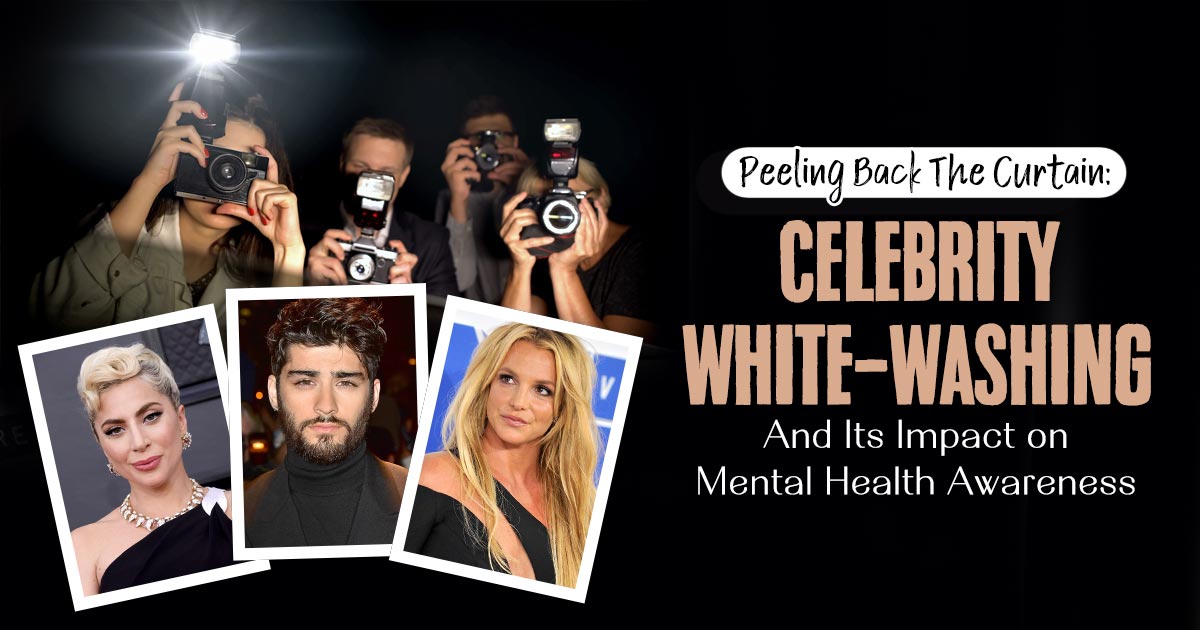The world of celebrity culture has always been a double-edged sword, where fame and glamour often come at the cost of personal privacy and mental well-being. In recent years, the conversation surrounding mental health has gained prominence, helping to reduce stigma and raise awareness.
However, there is a disturbing trend within the realm of celebrity culture where the portrayal of mental health issues has been glamorized, sanitized, and sometimes even romanticized. This phenomenon, often referred to as the ‘celebrity white-washing of mental health’ inadvertently perpetuates the idea that mental health issues are attractive or alluring.
The Celebrity White-washing Of Mental Health
Celebrity culture thrives on idealized images of stars, which are often far from the reality that many of these individuals experience. The glossy magazines, Instagram filters, and red carpet appearances can easily create the illusion of a perfect, stress-free life. However, behind the scenes, many celebrities grapple with various mental health issues like depression, anxiety, and addiction, just like anyone else.
The phenomenon of celebrity white-washing of mental health stems from the media’s tendency to selectively highlight and glorify certain aspects of these stars’ lives, particularly their struggles with mental health. Celebrities are often portrayed as tortured geniuses, rebels, or misunderstood artists whose demons make them even more intriguing. This selective portrayal can give the impression that having a mental health issue is a glamorous accessory to fame, rather than a serious and often debilitating condition.

Romanticizing Mental Health Struggles
The portrayal of mental health issues in the media is far from realistic. It often romanticizes the suffering of celebrities, turning their struggles into tragic narratives that captivate audiences. This romanticization has far-reaching consequences, as it can lead to the normalization of mental health issues and perpetuate the idea that they are ‘sexy’ or desirable.
For instance, some celebrities have been praised for their supposed authenticity in sharing their struggles with mental health. While it is undoubtedly crucial for public figures to be open about their mental health experiences, it can inadvertently glamorize these issues when their battles are framed as something heroic or enigmatic. The constant media attention, fan adoration, and media coverage can reinforce the idea that mental health struggles are an essential part of being famous.
The Impact On Public Perception Of Mental Health
The portrayal of mental health issues in this light can have a significant impact on public perception. When individuals see their favorite celebrities seemingly thriving despite their mental health issues, it can create the illusion that these struggles are not as debilitating as they are often portrayed.
This skewed perception may lead to people underestimating the severity of their own mental health issues or delaying seeking help, as they believe they can handle their problems without professional assistance.
Moreover, the celebrity white-washing of mental health and the romanticization of mental health issues in the media can inadvertently trivialize the experiences of those who struggle with such issues daily.
When the media showcases celebrities as ‘sexy’ or intriguing for having mental health problems, it may imply that those who do not have such problems are somehow less interesting or less ‘deep.’ This creates an unhealthy hierarchy where the presence of mental health issues is unintentionally glamorized.
Contributing To The Stigma Of Mental Illness
Paradoxically, while the media may aim to reduce the stigma surrounding mental health issues, celebrity white-washing of mental health can reinforce it. It may create a situation where individuals who have genuine mental health concerns are afraid to seek help or discuss their issues openly because they fear they will not be seen as ‘cool’ or ‘attractive’ in the eyes of society.
Stigma can have detrimental effects on the well-being of those with mental health issues. It can deter people from accessing the necessary support and treatment, leading to worsening conditions and even tragic outcomes. When the media romanticizes mental health issues in celebrities, it inadvertently contributes to a culture where individuals are hesitant to share their struggles openly and honestly.
The Commercialization Of Mental Health
The commercial aspect of celebrity white-washing of mental health cannot be ignored. Many industries profit from the portrayal of mental health issues in a ‘sexy’ light. Self-help books, wellness products, and even fashion lines are marketed based on the supposed allure of mental health struggles. The profit motive behind this trend not only further commodifies mental health issues but also perpetuates the notion that they are a desirable aspect of one’s identity.
Celebrities themselves often profit from sharing their mental health journeys. While their intentions may be genuine in many cases, it cannot be denied that opening up about mental health can boost their popularity and public image. This blurs the line between genuine advocacy and the exploitation of personal struggles for financial gain.




























